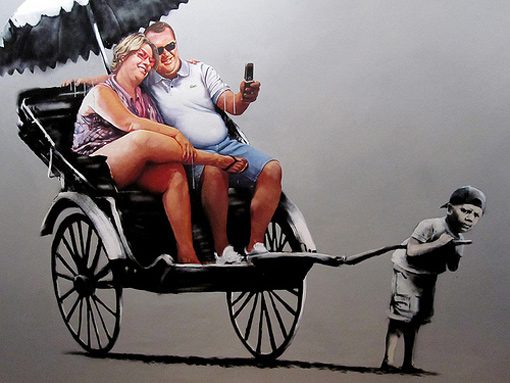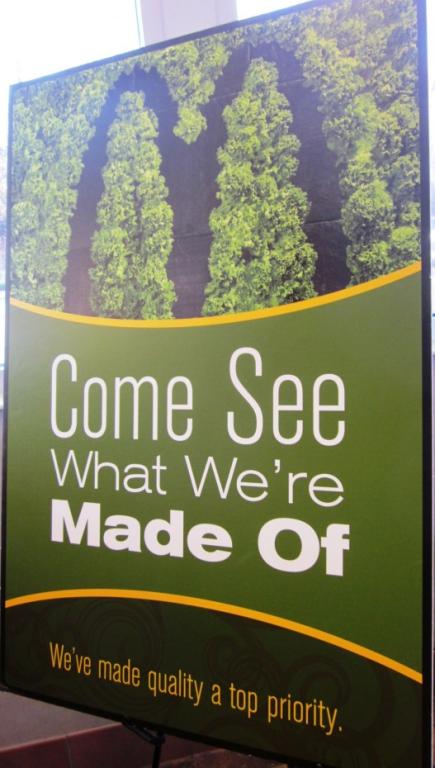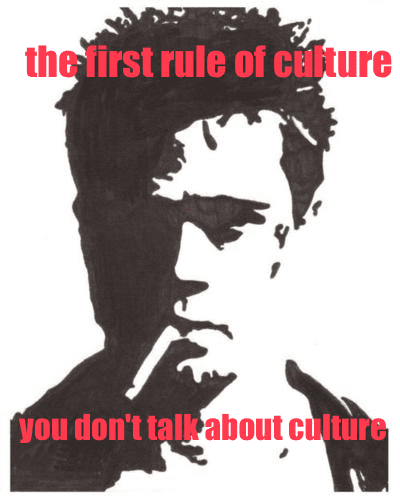“In the end, therefore, money will be the one thing people will desire, which is moreover only representative, an abstraction.” -Kierkegaard
When a male of the Mandan Indians fasts for three days, shaves his head, and hangs from splints pushed through his skin to prove his manhood to the universe he is not thinking of traditional Mandan culture. He is becoming a man.
Nor is the Mexican Catholic, crawling on her hands and knees to venerate an image of the Blessed Mother, “participating in traditional Mexican culture” by way of “religious activity”. She is crawling on her hands and knees. It’s the touristing graduate of World History II who — grimacing over his tequila like a pansy — scoops the value from her act and labels it a “cultural phenomenon”.
From the anecdotes to the point:
To speak about something is to assume a place outside of it, referring to reality as an objects perceived. But culture is that lens of tradition and value by which we perceive reality, and a man cannot perceive a lens any more than he can his corneas. Thus nobody living their culture refers to it as “culture”, and you’ll seldom hear an Italian say “let’s be real Italians and eat tortellini” except in reflection, jest, or to white people. From curry to bar-mitzvahs, cultural things are things done, not labeled, lived, not spoken of, real, not reflected on.
Talk-about-culture makes culture an object of academic discussion divorced from life, which is precisely what culture isn’t. Talk-about-culture is the death of culture and the birth of tourism, for talk-about-culture puts labels on traditions, customs, values and events, and removes them from the human experience which is their soil. It follows that the signs of a land-without-culture would paradoxically include a preoccupation with talking about culture, of celebrating culture and diversity, of touristing, and of all the while not doing anything interesting.
 So I must argue — quite unwillingly — that the typical denizen of the United States — of which I claim no exemption — has no culture.
So I must argue — quite unwillingly — that the typical denizen of the United States — of which I claim no exemption — has no culture.
It would be ridiculous for a Native American tribe to arbitrarily select a symbol of their culture. Had a meeting of elders released a statement to the world saying “We have decided, as of Wednesday, that the pinecone is the appropriate signifier of our existence, and request all referring to us to bear this in mind”, none but those most diseased with political-correctness would be able to shake from their eyes visions of headdresses and war dances, of peace-pipes and the mighty bow. Why? Because you don’t talk about culture, and you certainly don’t speak culture into being.
Yet this is precisely what the United States attempts in its ridiculous and arbitrary creation of public holidays and days of remembrance. Cut off from any authentic concern, once removed from the experience of human life, our President declared that January 16th is to be Religious Freedom Day, an event as artificial and arbitrary as Black History Month, and as obscure Labor Day — that national Holy Day characterized by the fact that one in a thousand has any damn idea why he isn’t laboring.
The opposite of culture is fashion, for fashion is manufactured need, and thus it makes a sad sort of sense that the primary association the world has with America is our fashions, our banal pop-stars and ever-changing shoe styles. One might try to argue that “American culture” manifests itself in owning Japanese technology and wearing jeans, but these were given to us in the same manner Religious Freedom Day was given to us: artificially, marketed for our consumption for the profit of a few. A culture advertised and sold as culture violates the first rule of culture, and thus there’s a certain edge of despair that comes with acknowledging the fact that the great unifying symbol of our youth is:
Which brings me to my point. When anything authentic does happen, when any hapless, white American invents the bow or the headdress (so to speak) this minutia of culture is labeled, exploited, and sentenced to death, in that order. I’ll take for my example the Farmer’s Market.
Assumedly a Farmer’s Market was once a farmer’s market, in which a farmer sold you his food in a real and entirely human exchange of goods and good-wishes. It was something done. It was a part of the human experience. So how is it that I can say the words “Farmer’s Market” and fix in the heads of all my readers a movement and a certain type of repeated event that has a label, an ideology, and a life outside of itself — that is, an event entirely outside of culture? From whence came the capital letters?
Money.
We loved the farmer’s market and saw it become a trend, but a “trend” in a materialistic society is not allowed to remain a word we use to describe authentic, widespread enthusiasm. A trend is an opportunity to make money.
As a money-making opportunity it had to be given a label (God forbid it just keep happening). Once it had its label it could be grouped with a multitude of other labels — like “small business”, “local”, “green”, “organic” — and a whole host of Hot Titles! divorced from the human experience and banished to the Babylon of national politics, no longer words but baptized, born-again Buzzwords, the stuff advertising is made of. “Buy a cabbage from a cabbage-grower” is a suggestion that can’t last in the United States. It must become “go green!” or perish.

(This explains why there are humans who react with inhuman anger to a farmer selling his cabbage. It’s not because they have anything against the cabbage, it’s because they have much against the Green Revolution and Organic Food, and the cabbage-selling-farmer has been assumed and dissolved into these abstractions. He is rejected for the ghosts that surround him.)
Successfully removed from authentic experience, the Farmer’s Market is whored out to commercialization. Its values — that once existed for their own sake — are devoured by corporations and manipulated so as to serve the grand purpose of nothing ever changing, of food remaining some combination of bad, nationally owned, and bought and sold by corporate chains — all for the sake of money.
So now McDonald’s advertises “fresh” and “local” produce. Trader Joe’s has a monopoly on organic, simply-labeled food, printing off nutrition facts that look like your grandma wrote them. Local is defined as somewhere within 400 miles — which means that if you live in Maryland, your Indiana potatoes could very well be “local” — every food corporation became “green” overnight, and thus the final stage of the life of that authentic exchange between one man and another who grew a cabbage is born: Death.
Our obsession with money kills culture. It is the Ultimate Abstraction, a demon that seeks to devour every authentic act of human experience. Anything simply done has the capacity to be done not for itself, but for money.
If authenticity is marketed, sold and negated into fashion, culture is impossible. If the authentic actions of a community are deemed “trends” and manipulated to serve the pockets of the powers, they are stripped of their human value and cannot become all that we envy when we fly to poorer countries and take pictures of their dances, their markets, their food and their joy. What’s needed is a belief in things that can’t be sold.
I’ll be writing more on this, I can promise you that.















